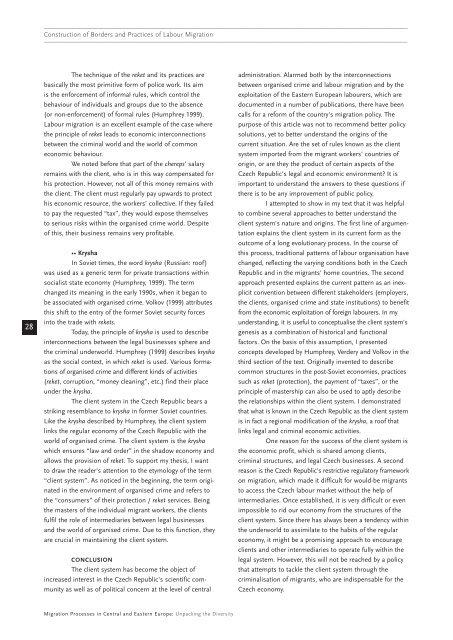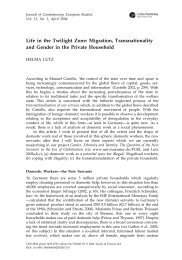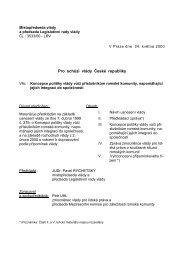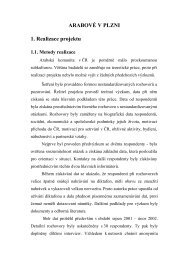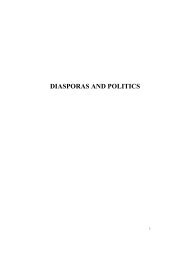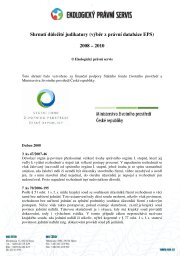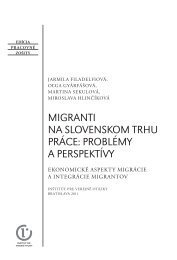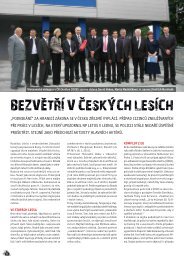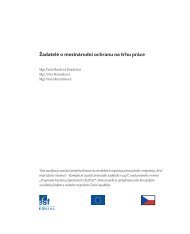Migration Processes in Central and Eastern Europe - Multiple Choices
Migration Processes in Central and Eastern Europe - Multiple Choices
Migration Processes in Central and Eastern Europe - Multiple Choices
Create successful ePaper yourself
Turn your PDF publications into a flip-book with our unique Google optimized e-Paper software.
———————————————————————————————————————————————————————————————<br />
Construction of Borders <strong>and</strong> Practices of Labour <strong>Migration</strong><br />
———————————————————————————————————————————————————————————————<br />
28<br />
The technique of the reket <strong>and</strong> its practices are<br />
basically the most primitive form of police work. Its aim<br />
is the enforcement of <strong>in</strong>formal rules, which control the<br />
behaviour of <strong>in</strong>dividuals <strong>and</strong> groups due to the absence<br />
(or non-enforcement) of formal rules (Humphrey 1999).<br />
Labour migration is an excellent example of the case where<br />
the pr<strong>in</strong>ciple of reket leads to economic <strong>in</strong>terconnections<br />
between the crim<strong>in</strong>al world <strong>and</strong> the world of common<br />
economic behaviour.<br />
We noted before that part of the chereps' salary<br />
rema<strong>in</strong>s with the client, who is <strong>in</strong> this way compensated for<br />
his protection. However, not all of this money rema<strong>in</strong>s with<br />
the client. The client must regularly pay upwards to protect<br />
his economic resource, the workers’ collective. If they failed<br />
to pay the requested “tax”, they would expose themselves<br />
to serious risks with<strong>in</strong> the organised crime world. Despite<br />
of this, their bus<strong>in</strong>ess rema<strong>in</strong>s very profitable.<br />
•• Krysha<br />
In Soviet times, the word krysha (Russian: roof)<br />
was used as a generic term for private transactions with<strong>in</strong><br />
socialist state economy (Humphrey, 1999). The term<br />
changed its mean<strong>in</strong>g <strong>in</strong> the early 1990s, when it began to<br />
be associated with organised crime. Volkov (1999) attributes<br />
this shift to the entry of the former Soviet security forces<br />
<strong>in</strong>to the trade with rekets.<br />
Today, the pr<strong>in</strong>ciple of krysha is used to describe<br />
<strong>in</strong>terconnections between the legal bus<strong>in</strong>esses sphere <strong>and</strong><br />
the crim<strong>in</strong>al underworld. Humphrey (1999) describes krysha<br />
as the social context, <strong>in</strong> which reket is used. Various formations<br />
of organised crime <strong>and</strong> different k<strong>in</strong>ds of activities<br />
(reket, corruption, “money clean<strong>in</strong>g”, etc.) f<strong>in</strong>d their place<br />
under the krysha.<br />
The client system <strong>in</strong> the Czech Republic bears a<br />
strik<strong>in</strong>g resemblance to krysha <strong>in</strong> former Soviet countries.<br />
Like the krysha described by Humphrey, the client system<br />
l<strong>in</strong>ks the regular economy of the Czech Republic with the<br />
world of organised crime. The client system is the krysha<br />
which ensures “law <strong>and</strong> order” <strong>in</strong> the shadow economy <strong>and</strong><br />
allows the provision of reket. To support my thesis, I want<br />
to draw the reader's attention to the etymology of the term<br />
“client system”. As noticed <strong>in</strong> the beg<strong>in</strong>n<strong>in</strong>g, the term orig<strong>in</strong>ated<br />
<strong>in</strong> the environment of organised crime <strong>and</strong> refers to<br />
the “consumers” of their protection / reket services. Be<strong>in</strong>g<br />
the masters of the <strong>in</strong>dividual migrant workers, the clients<br />
fulfil the role of <strong>in</strong>termediaries between legal bus<strong>in</strong>esses<br />
<strong>and</strong> the world of organised crime. Due to this function, they<br />
are crucial <strong>in</strong> ma<strong>in</strong>ta<strong>in</strong><strong>in</strong>g the client system.<br />
CONCLUSION<br />
The client system has become the object of<br />
<strong>in</strong>creased <strong>in</strong>terest <strong>in</strong> the Czech Republic's scientific community<br />
as well as of political concern at the level of central<br />
adm<strong>in</strong>istration. Alarmed both by the <strong>in</strong>terconnections<br />
between organised crime <strong>and</strong> labour migration <strong>and</strong> by the<br />
exploitation of the <strong>Eastern</strong> <strong>Europe</strong>an labourers, which are<br />
documented <strong>in</strong> a number of publications, there have been<br />
calls for a reform of the country's migration policy. The<br />
purpose of this article was not to recommend better policy<br />
solutions, yet to better underst<strong>and</strong> the orig<strong>in</strong>s of the<br />
current situation. Are the set of rules known as the client<br />
system imported from the migrant workers' countries of<br />
orig<strong>in</strong>, or are they the product of certa<strong>in</strong> aspects of the<br />
Czech Republic's legal <strong>and</strong> economic environment? It is<br />
important to underst<strong>and</strong> the answers to these questions if<br />
there is to be any improvement of public policy.<br />
I attempted to show <strong>in</strong> my text that it was helpful<br />
to comb<strong>in</strong>e several approaches to better underst<strong>and</strong> the<br />
client system's nature <strong>and</strong> orig<strong>in</strong>s. The first l<strong>in</strong>e of argumentation<br />
expla<strong>in</strong>s the client system <strong>in</strong> its current form as the<br />
outcome of a long evolutionary process. In the course of<br />
this process, traditional patterns of labour organisation have<br />
changed, reflect<strong>in</strong>g the vary<strong>in</strong>g conditions both <strong>in</strong> the Czech<br />
Republic <strong>and</strong> <strong>in</strong> the migrants' home countries. The second<br />
approach presented expla<strong>in</strong>s the current pattern as an <strong>in</strong>explicit<br />
convention between different stakeholders (employers,<br />
the clients, organised crime <strong>and</strong> state <strong>in</strong>stitutions) to benefit<br />
from the economic exploitation of foreign labourers. In my<br />
underst<strong>and</strong><strong>in</strong>g, it is useful to conceptualise the client system's<br />
genesis as a comb<strong>in</strong>ation of historical <strong>and</strong> functional<br />
factors. On the basis of this assumption, I presented<br />
concepts developed by Humphrey, Verdery <strong>and</strong> Volkov <strong>in</strong> the<br />
third section of the text. Orig<strong>in</strong>ally <strong>in</strong>vented to describe<br />
common structures <strong>in</strong> the post-Soviet economies, practices<br />
such as reket (protection), the payment of “taxes”, or the<br />
pr<strong>in</strong>ciple of mastership can also be used to aptly describe<br />
the relationships with<strong>in</strong> the client system. I demonstrated<br />
that what is known <strong>in</strong> the Czech Republic as the client system<br />
is <strong>in</strong> fact a regional modification of the krysha, a roof that<br />
l<strong>in</strong>ks legal <strong>and</strong> crim<strong>in</strong>al economic activities.<br />
One reason for the success of the client system is<br />
the economic profit, which is shared among clients,<br />
crim<strong>in</strong>al structures, <strong>and</strong> legal Czech bus<strong>in</strong>esses. A second<br />
reason is the Czech Republic's restrictive regulatory framework<br />
on migration, which made it difficult for would-be migrants<br />
to access the Czech labour market without the help of<br />
<strong>in</strong>termediaries. Once established, it is very difficult or even<br />
impossible to rid our economy from the structures of the<br />
client system. S<strong>in</strong>ce there has always been a tendency with<strong>in</strong><br />
the underworld to assimilate to the habits of the regular<br />
economy, it might be a promis<strong>in</strong>g approach to encourage<br />
clients <strong>and</strong> other <strong>in</strong>termediaries to operate fully with<strong>in</strong> the<br />
legal system. However, this will not be reached by a policy<br />
that attempts to tackle the client system through the<br />
crim<strong>in</strong>alisation of migrants, who are <strong>in</strong>dispensable for the<br />
Czech economy.<br />
<strong>Migration</strong> <strong>Processes</strong> <strong>in</strong> <strong>Central</strong> <strong>and</strong> <strong>Eastern</strong> <strong>Europe</strong>: Unpack<strong>in</strong>g the Diversity


